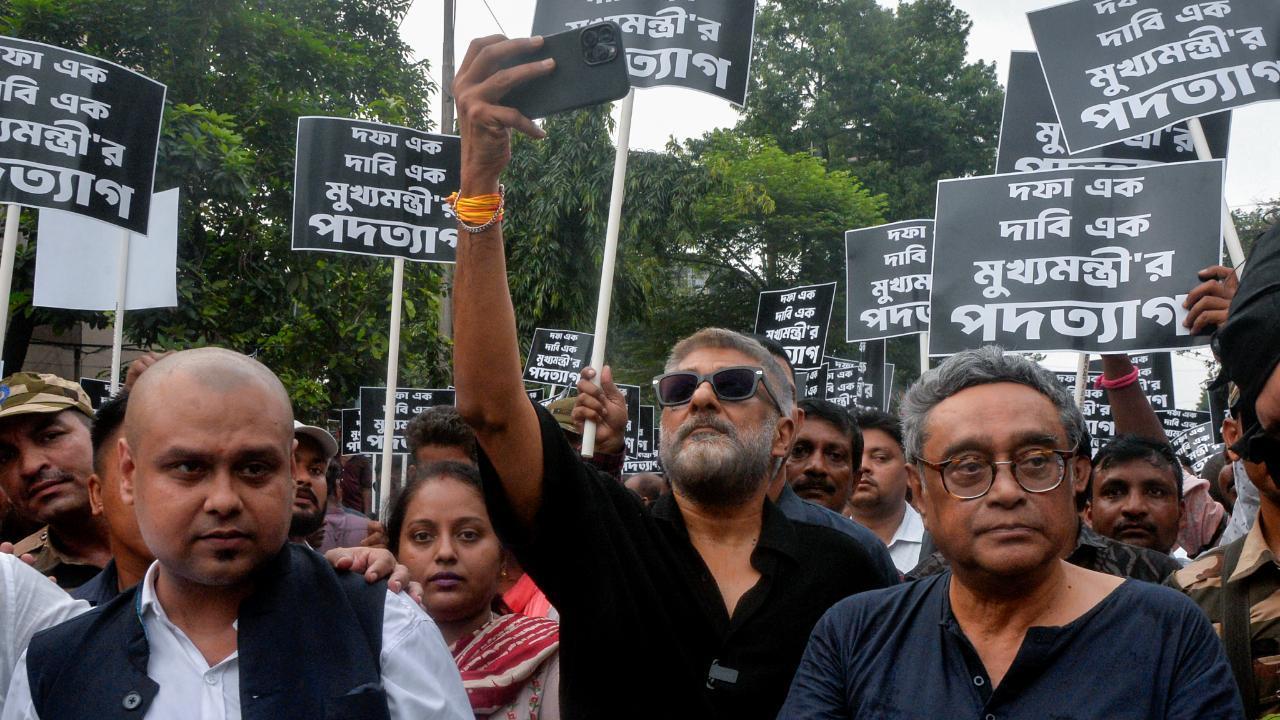
In a powerful and emotional demonstration, filmmaker Vivek Ranjan Agnihotri has stepped into the spotlight to join a protest rally condemning the alleged rape and murder of a trainee doctor at RG Kar Medical College and Hospital in Kolkata. Speaking vehemently to the media, Agnihotri emphasized the need for a resounding change in Bengal’s current political landscape to prevent such heinous acts from recurring.
With visible anger and sorrow, Agnihotri articulated his grievances to ANI on Wednesday. Addressing the tragic incident, he said, “My demand is just this that since the time of the Direct Action Day, rape has been used as a political weapon. In Bengal, communal, political, electoral violence should end. And we have to make Bengal great again. And that is possible only if the current political system is completely changed.” His call for action resonated with many as he added that the incumbent government had utterly failed to ensure the safety and security of its citizens.
Furthermore, Agnihotri emphasized his participation as a beacon of inspiration for the youth. “I have come here because many young people are asking me. I want them to get inspired that yes, if I can stand here and protest, they can too. We have to make Bengal great again if we want India to succeed,” he stated. His words underscored the importance of collective civic engagement in bringing about societal change.
The incident that has triggered this wave of outrage occurred on August 9, when a postgraduate trainee doctor was allegedly raped and murdered while on duty at RG Kar Medical College. This brutal crime has catalyzed nationwide strikes and vociferous demands for justice. Across various states, civil society groups and medical professionals have joined forces, calling for severe punishment for the perpetrators and heightened security measures for doctors.
.
In response to the escalating unrest, the Supreme Court has swiftly constituted a 10-member National Task Force aimed at developing comprehensive recommendations to curb violence and ensure safe working conditions for medical professionals. This task force features esteemed members, including Surgeon Vice Admiral Arti Sarin. The apex court, moved by the gravity of the incident, has instructed the task force to present an interim report within three weeks and a conclusive report within two months.
Simultaneously, the Supreme Court has directed the Central Bureau of Investigation (CBI) to submit a status report on the ongoing investigation into the rape case. Additionally, the court has requested detailed reports from the West Bengal government regarding the mob attack incident that transpired at RG Kar hospital on August 15.
The widespread condemnation of the crime has been echoed by various civil society organizations and medical associations, all of which are demanding swift justice. The Kolkata Police have acted promptly in response, arresting a civic volunteer the day following the crime. The act is viewed as a small step toward addressing the larger issue of safety and security for medical professionals in West Bengal.
This disturbing event has brought to the forefront the longstanding issues of communal, political, and electoral violence in the state. As expressed by Agnihotri, these forms of violence have deep-rooted historical antecedents, including the infamous Direct Action Day. His assertion that rape has been employed as a political weapon for decades illuminates the urgent need for systemic transformation and sustained law enforcement efforts.
The formation of the National Task Force by the Supreme Court is seen as a pivotal step toward addressing these concerns. The judiciary’s proactive stance sends a strong message that the safety of medical professionals is paramount and that violence of any nature will not be tolerated. The task force’s findings and recommendations will be eagerly awaited, with the hope that they will pave the way for significant reforms.
As tensions remain high and the call for justice intensifies, the participation of public figures like Vivek Ranjan Agnihotri in the protest rally serves to amplify the voices demanding change. His engagement in this critical issue brings additional attention to the systemic challenges that Bengal and, by extension, India must address to ensure security and justice for all its citizens.










